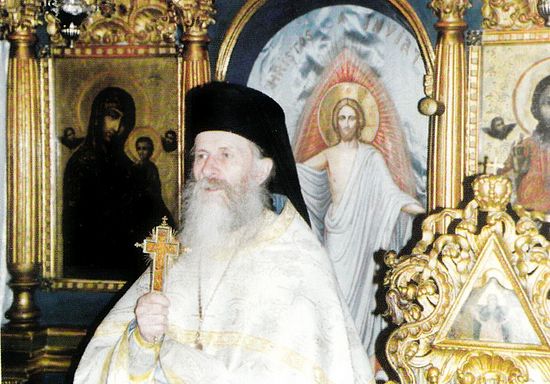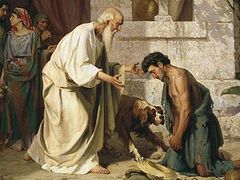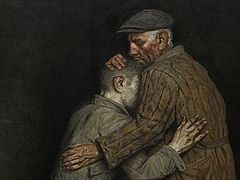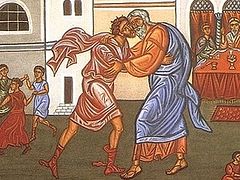Father, I have sinned against heaven, and before Thee, and am no more worthy to be called Thy son: make me as one of Thy hired servants.
(Luke 15:18-19)
Beloved faithful! Today's Gospel reading, as well as the one we read last week, sets the same significant goal before us—to prepare both our soul and body for the ascetic labor of holy Great Lent. Last Sunday, the Gospel reminded us about the sin of pride and the vital importance of humility; this week the Scripture speaks about the repugnant passion of lust and the saving power of repentance.
How wise holy fathers were! First they revealed pride that causes death to our soul, and then they unmasked lust that kills our body. The former, the sin committed by Adam, settles in the heart to kill the soul, the latter invades our mind to kill the body. When both are present, they destroy us completely, dragging us into the bottomless abyss of fire and death.
Thus, the human soul is commingled with the body just as pride is inseparable from lust. The sin of lust is usually preceded by pride. The Holy Fathers claim in unison, “The one vain with his virtues falls into lust” (St. John Climacus, The Ladder of Divine Ascent. Step 4. On obedience. Chapter 27). Therefore, if we want to prepare our body and soul for the labor of Lent, let us speak of the passion of lust and the power of repentance. First of all, let us follow the Gospel.
The man having two sons is our conscience. The body in this parable corresponds to the younger son, for it is weaker and prone to sin. The elder son is our soul, for it is more rooted in the virtue of obedience to God.
When conquered by passions, the body asks the conscience to give it its share of property in order to waste it on riotous living. Thus, the body craves freedom, money, good clothes, food, wine, sinful pleasures, etc. Getting rid of the bridle of conscience, drunk with freedom, youth and various passions, it takes its journey to the country of lust, strange to God, and forgets the conscience, its elder brother and master.
There the body wastes its natural gifts—health, youth and substance, its wonderful years and freedom. There it faces terrible famine, i.e., severe illnesses, poverty, tribulations and, finally, despair. There it becomes a slave of satan, who makes it take care of the swine—all bestial sins—and drags others into that abyss. Each carnal sin is followed by other sins, each more severe than the next.
What a horrible fall, brothers! The more we succumb to the passion of lust, the more it is difficult to heal; it seems even more awful for it prevails over everyone. There is no other sin so disgusting for people and the Lord than lust, and no other sin is so pervasive in the whole world. The dark spirit of lust is present everywhere—in the body of both a boy and an elderly man, in the house of both the poor and the rich, in the guard’s cabin and the wealthy man’s palace.
Nowadays the passion of lust acts with excessive fury and zeal. It breaks the most pure and honorable vessels, it charms the most praiseworthy minds, it mistreats the bodies of the youngest, it stains the purest cheeks of chastity, it lies to the mothers of the youngest and instills disgrace into the eldest. This demonic spirit feels no sympathy for innocent babies, withered breasts or childless parents. It hardens mothers’ hearts into stone, turns spouses into murderers, and makes the young immoral. It defeats everyone to make them children of Hinnom.
Where does all the devil’s outrage at the human race spring from? Knowing how few days are left to us, could satan be striving to tempt people by multitudinous carnal sins that most easily ensnare everyone? This must be the only explanation why this sin is so pervasive nowadays. There is scarcely a young man nowadays who hasn’t committed that sin before marriage. Rarely can we find a woman who hasn’t yielded to that temptation of her own will. We know hardly any couple who has managed to preserve their bed undefiled, or newlyweds who are not threatened by divorce by reason of this disdainful passion.
Consequently, lust is now a social ulcer for all humankind, an unknown cancer that seems incurable. The spirit of lust roars like a lion and prowls everywhere trying to tempt as many as possible. We may find it anywhere—it frivolously wanders along the streets, stands on every crossing, idles its time away in bars, hangs out at parties, attracts the young, stays with married couples, never leaves houses of widows, laughs in the streets, acts unceasingly in shops and markets trying to give hope for something great. It incites people to drink, tell stupid jokes, arrange sinful meetings, and sleep too much. The spirit of lust knocks at every door, opens gates to a many houses and windows to a great many hearts, it softens the most unshakable convictions, it makes a cult of the body and makes the sin seem quite insignificant.
Hardly is there any path it hasn’t taken in its hunt for human souls! Is there any village where it doesn’t live, any city it doesn’t rule over, or a street it doesn’t walk along shamelessly, so that if we don’t try to resist it, it comes into our home uninvited? Sometimes the spirit of lust strolls along the most desolate streets, waging severe warfare with even the most experienced hermits and saints.
The holy fathers advise that we should not fight this terrible sin, but run away from it, for we are not wiser than King David or Solomon whom lust defeated.
Rare is the man who is not infected with this dark spirit; but happy is the one, who assailed by lust comes out strong and victorious, just as Joseph did in Egypt. Blessed is one who commits no sin by his gaze, more blessed is one who commits no sin in his thoughts, and thrice blessed is one who does not fall into the sin though the five senses.
This sin penetrates the human heart unnoticeably. First it comes through eyes and ears, then permeates the thoughts, imagination, mind, and will, and then it reaches the heart; the sin is ready—the fortress is taken and the soul is subdued. Thus, unbridled feelings bear lust. It’s nurtured by excessive sleep and gluttony. If an individual drinks, has sinful pleasures, and behaves conceitedly, it matures and enslaves him; the same happens when people feel estranged from church, prayer, sincere confession, fasting and Christian life. On the contrary, what conquers lust is prayer, what weakens it is fasting, what cleanses it is frequent confession of sins, what heals it is humility, what dispels it are self-restraint and remembrance of death.
We can perceive the devastating effect of lust though its consequences, that are dreadful and can be seen everywhere. Undoubtedly, lust’s most common impact is suffering: physical pain, weakening and unsoundness of mind, or even death. But the most horrendous impacts are total estrangement from God and despair.
One who is self-restrained is mentally and physically well developed; his face is light, his eyes are clear, his words are sweet. One who is adulterous is always fragile; his face is pallid, his eyes are red and anxious, his word is cruel and appealing, his body often trembles. Such people don’t sleep well and dream mostly nightmares.
Those who are self-restrained are calm and peaceful in all misfortunes; they think deeply, enjoy fasting, prayer and confession, and take Holy Communion with great pleasure and joy. On the contrary, those who are tainted by this sin always look anxious, are quarrelsome, and distracted in thoughts; their minds are weary and confused, their feelings are not pure. They completely avoid fasting for, as they say, it makes them weak; they do not attend church for they have no time; they do not pray as they are ashamed before people; they do not confess their sins for the fear of the priest; and they do not reject the sin for, as they believe, they cannot be saved. An adulterous person is afraid of death; he wishes there were no God, no death, no judgment so that these sins should never be revealed.
If he abstains from the sin, his family lives in peace, his children are joyous and healthy, his wife is obedient and merciful—everything in his life is permeated with virtue. But the house seized by the passion of lust is constantly bombarded with squabbling, invectives, debauches and excessive drinking, incurable illnesses, divorces and trials. The wife feels no joy being a mother, the cradle remains empty, their garden is lifeless—everything is turned upside down.
How torturous and terrible is the life of a man conquered by the evil of lust and despair! Beloved faithful, let us continue to follow the thread of Gospel.
Sated with sins, abandoned by children, wife, friends, and his own conscience, estranged from Divine Grace, the adulterous man may one day come to his senses. He comes to his senses recollecting his innocent childhood, his mother’s love who had put so much effort into raising him, and the Lord’s mercy; like the prodigal son, he is embraced by nostalgia for his father’s home.
Rebuked by his conscience, attacked by illnesses, horrified by impending death, he rises from his fall, gazes into space. Tearful, he regrets what he has done. That distant country seems disgusting, and he begins to cry bitterly. So he turns to his soul, his conscience, his Father and screams, “My soul, my soul, arise! Why art thou sleeping?” [Great Canon of St. Andrew of Crete]; or cries like the prodigal son, “Father, I have sinned against heaven, and before Thee, and am no more worthy to be called Thy son: make me as one of Thy hired servants” (Luke 15:18-19). I have defiled the earth with my sins, wasted the years of life, my precious health, my youth and property; I was not obedient to you, I abandoned your house, deprived myself of the joy of attending Your church. I defiled my bed and my body. I mortified the fruit of my body, abused my wife and tempted a great deal of people with my sins! I can bear it no more; I’m hungry, all my new clothes are tattered, I have no more money, illnesses affect me. There is no one to shelter me, to heal me, to know me! God, let me be with You! I have sinned against heaven, and before You, but make me Your last servant!”
Oh, how rare and how precious is the repentance of an adulterous man!
And the merciful Lord, Who is always generous, goes towards him, awaits him, embraces him and listens to his confession, forgives his trespasses, and finally gives him new robes of repentance, puts a ring on his hand and invites him to His house. There, being merry, He kills a fatted calf for him.
The Lord takes His prodigal son back if he has deep repentance in his heart, honestly confesses his sins and observes the penance imposed by a priest. Thus the man gets new robes of hope for salvation and a wears a golden ring, which is a sign that his sins have been forgiven and he is now betrothed to Christ. Then he enters the holy church, where angels rejoice over his coming back; there he receives Holy Communion and redeems himself.
Beloved faithful, the passion of lust is strong, but stronger is the mercy of God! It is true that the whole world seems to be the house of evil, and God is patient. The sin is now harder to forgive; we commit it without ever concealing it, flagrantly and shamelessly. But the Lord is patient. He goes toward us, looks for us and knocks on the door of our heart with the hand of His mercy. If we do not respond, He comes with illnesses, trials, or poverty. This may be the only way to awaken our repentance. We are slow to repent, but the Lord is still patient!
After Adam committed sin, God did not leave him completely alone. Adam desired the fruit, was tempted and succumbed to this temptation, fell and did not confess his sin honestly, but shifted the blame onto Eve. Therefore he was expelled from the Garden to the country of sin. There, in a distant land, Adam—intimidated by thorns and wolves—remembered his Father and began to desperately call, “Lord, I am no more worthy to be in the Garden of Eden, but make me one Thy most sinful servants. I looked at the fruit, desired it and sinned, but take me back. Out of the depths have I cried unto thee, O Lord! Lord, hear my voice... Bring my soul out of prison” (Psalms 129:1; 141:8).
Adam and his descendants had been weeping that way for many years. The merciful God hearkened to their prayers, going towards them. In the place where they met, a Cross soaring to heaven was erected; that was the Cross of God’s mercy.
The Lord goes to every one of us, calls us to repentance, and waits for us our whole life. He desires that we at least come. And if we hearken to God’s voice, repent of our sins and turn to a new life of penitence, Christ will meet us with His ineffable joy: We were lost, and are alive again; we were lost, and are found (Luke 15:24).
However, if we neglect His words, feel no repentance, He will await us on threshold of a desolated church or on the way; full of paternal misery, He will cry with the prophet’s words: I have nourished and brought up children, and they have rebelled against me. The ox knoweth his owner, but Israel doth not (Isaiah 1:2-3), Man that is honor and understandeth not, is like the beasts that parish (Psalms 48:21).
The way of fasting is one of the best ways to reject any kind of earthly, sensuous pleasure and return to Christ. To overcome self-indulgence one has to keep the fast, to bridle frivolous thoughts one has to practice humility, to cleanse sinfulness of heart one has to burn it out with the attentive prayer and deep humility.
Great Lent awaits us—it is the good, holy, and royal way of repentance, the way leading us to the meeting of the Lord. That is why we read about the Prodigal Son before Lent. Let us reject any kind of revolting lust. And with lust, let us reject all other sins.
May mothers take care of the fruit of their womb, for they will have to face grave condemnation for the sin of infanticide. May parents foster the honor of family, so that they can enjoy their children’s longevity and happiness. May children obey their parents, unless they want to follow the example of the Prodigal Son. Let the young and the elderly, girls and widows, the poor and the rich, run away from the ulcer of carnal pleasures if they want joy and peace to embrace their souls in this life, and if they want to acquire eternal peace in the afterlife.
Parents should look after their children, instill goodness into them; parents should not let their children out from under their wings while they are still small, they should not leave them without care so that the whirlwind of carnal sins would overwhelm them and they should perish without God. Attend church with them as often as possible, go to confession with them, make them faithful children of Church and society and not the devil’s servants. Let us love our Father’s home, where we all were born spiritually. Let come back home!
This coming back may take an hour or a day, but the Church gives us seven weeks of fasting and repentance. Each day of Great Lent is a step that takes us higher and higher, so that we finally meet with Christ. At the begging of Great Lent, we are like Adam cast out from the Garden of Eden, and like the Prodigal Son. As Pascha approaches, like children returning to their father’s home we become like the redeemed Adam, and the son whom his father has found. Palm Sunday is the day we enter Jerusalem with our Lord, sup with Him in unspeakable joy and partake of the fatted calf—that is, we receive Holy Communion. Worthy of entering the New Jerusalem with Christ and eating His supper is the one who has broken the bonds of the sin, who confesses sins and keeps the fasts.
That is the true sense of today’s Gospel reading. Therefore, in conclusion, beloved faithful, let us reject spiritual pride and self-indulgence. Let us live a new life, the life that is pure, peaceful and righteous. We are not temples of lust, but temples of the Holy Spirit (1 Corinthians 6:19.). There are myriads of childless parents, impoverished families, and empty cradles; there are many children without their mother and mothers who feel no joy. We should be none of these. We have wasted our youth on pleasures, but that is enough! Arise, let us go to Christ!
What will lead us to Him is fasting, what will make Him merciful are our prayers, confession, prostrations, and tears. We will fall before Him saying, “Father, I have sinned against heaven, and before Thee.” Being our Merciful Father, He will embrace us, tear up the handwriting of our sins, heal our illnesses and wipe away our tears; He will strengthen our faith, dress us in white robes and put a golden ring on our hand, which is a sign of reconciliation. He will enter His Church with us, and nourish us with His Body and Blood. He will rejoice unspeakably with heaven and earth, for we were dead, and are now alive, we were lost, and now are found. Amen.
Arhimandrit Ioanichie Bălan. Predici la Postul mare. Mănăstirea Sihăstria, 2007. pp. 18–28.
Translation from the Russian version by Maria Litzman






